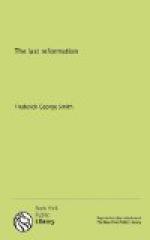We have already shown that development of ecclesiasticism which culminated in the papacy. From the primitive autonomy of the local churches, there came the centralization and consolidation of churches sectionally under a human headship with administrative functions, then provincial or national centralization, then finally the primacy of Rome over them all. The reason for this is evident. When the moral and spiritual dominion of Christ’s kingdom was lost to view or could not be appreciated, the wrong conception of the church as a world-empire naturally took possession of men’s minds; for in that age vast, centralized, imperial power was the ideal government. When, however, the political empire fell, and men witnessed the ruin of their political ideal, they sought to realize the same universal conception in a world-church possessing imperial powers under the pope of Rome.
[Sidenote: National churches]
At the period of the Reformation the Christian world had been in the grip of this world-church idea for more than a thousand years. As already stated, the reformers, whose minds were directed chiefly toward the restoration of evangelical doctrine, had at first no idea of breaking away from this standard. Evidently they had no conception of that moral and spiritual dominion of Christ by which alone he governs his church—a ‘kingdom that is not of this world.’ They therefore abandoned the world-church idea reluctantly, and not until the opposition of the hierarchy drove them to separation. When the issue was clearly drawn, they of course decided to obey God rather than man. Having no idea of the real spiritual character of the divine ecclesia, they had to content themselves with that national church unity which was still in their power.
The clergy, who had long been accustomed to the imperial tie, believed that a national headship was now necessary. The governments of Europe at that time were for the most part absolute monarchies, about the only limits to the sovereign power of these kings being the control which the pope exercised over the ecclesiastical affairs of the nations. From this control the Reformation liberated them. Therefore they eagerly took upon themselves the oversight of the national churches, and thus came into existence the church-and-state system of Protestant Europe. To a great extent the power that the imperial head of the church lost was acquired by the national heads.
All this seemed perfectly consistent to the reformers. They felt the necessity of lodging somewhere that power of human control which had been formerly exercised by the pope. As one writer has said, “They could not understand that Christianity could prosper without a strongly organized and governed church or without the presence of a strong and vigorous hand ready at all times to repress dissent and enforce uniformity of faith and worship.” The time of absolute religious freedom was not yet.




